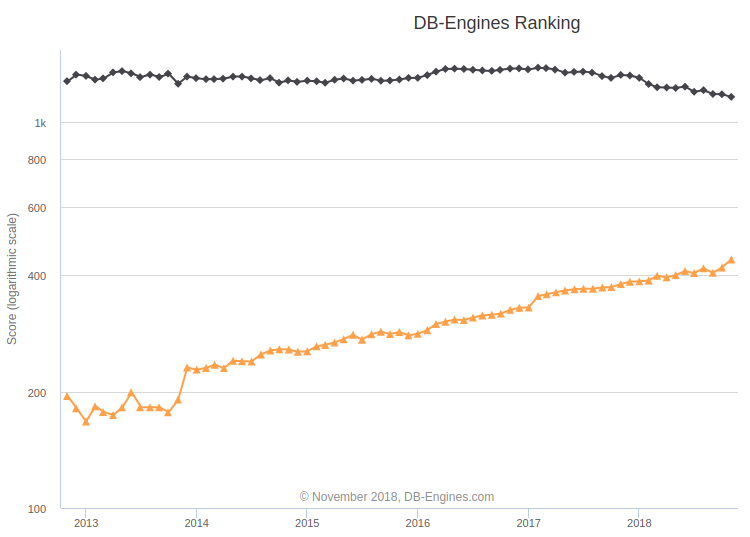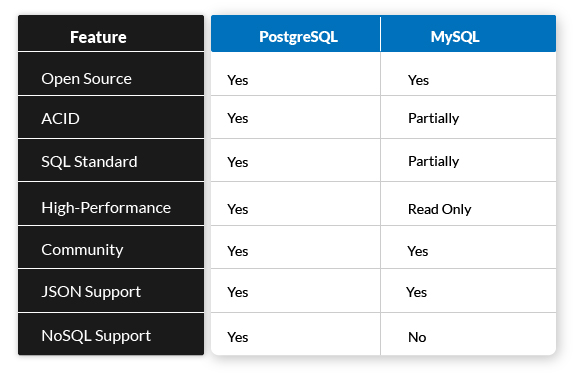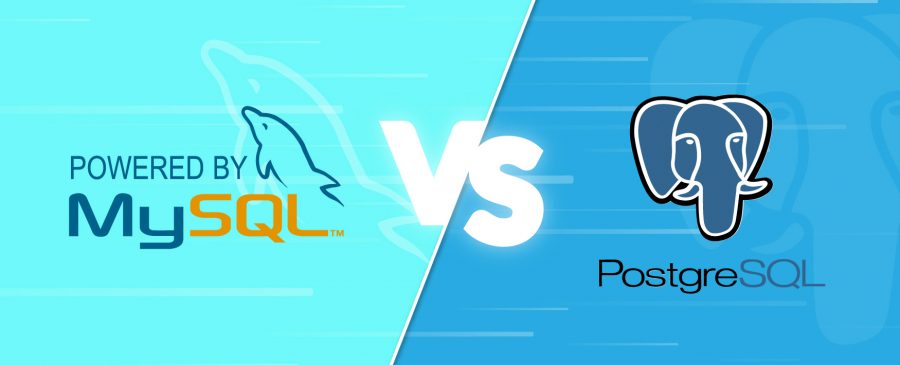Have you ever wondered what the best relational database for your project is? PostgreSQL vs MySQL. This could be, in most cases, a complicated question, but in this post, we will clarify some of the most important points to make the most appropriate decision, like the PostgreSQL vs MySQL performance. Let’s explore their most important features.
Table of contents
- Open Source
- PostgreSQL vs MySQL: Popularity
- ACID and SQL Standard
- PostgreSQL vs MySQL: Performance
- Do you need JSON?
- PostgreSQL vs MySQL
- Conclusion
- FAQs
Open Source
Nowadays, both are a free and available open source software with great benefits, such as flexibility, costs, security and a large community that supports them. If we speak of open source, I would say that the only really free is PostgreSQL, since MySQL was acquired by Oracle in 2010 making its license limited. There is nothing to worry about so far, but that could change if Oracle decides so.
Building a successful SaaS? Make sure you choose the right SaaS tech stack for your project.
PostgreSQL vs MySQL: Popularity
Is MySQL more popular than PostgreSQL? Of course, but this is due to its speed and low resource consumption. It is flexible and highly scalable, and obviously, because it is part of the LAMP stack… this makes it the favorite choice for web applications such as WordPress.
Although both database engines have a fairly large developer community, the advantage it has over PostgreSQL is quite remarkable, but do not be fooled by it, since in recent years its acceptance has increased, as shown in the following image.

ACID and SQL Standard
What is ACID? Well, ACID (atomicity, consistency, isolation, durability) is a set of properties of database transactions. Compliance with ACID ensures that no data is lost or transmitted to another place in the system in case of a failure, even when several changes are made during a single transaction.
“PostgreSQL is 100% compliant with ACID.”
PostgreSQL is almost complete with the SQL standard making it very easy to move from one database to another with similar standards such as Oracle, while MySQL standards and ACID complies are poorer as long as it uses InnoDB and NDB Cluster mechanisms.
PostgreSQL vs MySQL: Performance
It completely depends on the requirements of the application, however, we can consider the following aspects in the PostgreSQL vs MySQL debate:
- MySQL is a popular choice for web-based projects requiring a simple database for direct and simple data transactions, mostly read operations. It performs poorly when subjected to heavy loads or when trying to complete complex queries.
- PostgreSQL is widely used in large systems where to read and write speeds are crucial and the data needs to be validated. In general, the performance of PostgreSQL is better used in systems that require executing complex queries.
Do you need JSON?
Currently, with the explosion of Big Data applications, NoSQL databases are more common. And because their implementation is increasing day by day, both MySQL vs PostgreSQL have adopted JSON support. The thing is that only PostgreSQL has NoSQL features, native support for XML and JSON indexing.
Our professional Software Product Development services can help you choose the right databases and tools for your project.
PostgreSQL vs MySQL

Conclusion
This time, from an objective point of view on the PostgreSQL vs MySQL discussion , I will say that PostgreSQL is the winner due to the large number of superior features it has over MySQL. A really important point to consider is that it is much simpler and cheaper to implement MySQL because its developer community is much more extensive than PostgreSQL. If you plan to develop an application that requires a large database, high performance in both reading and writing and executing complex queries, I will definitely advise you to use PostgreSQL. Also, feel free to contact us if you need personalized assistance based on your project’s requirements.
FAQs
In the debate on Postgresql vs. Mysql, we consider that PostgreSQL is the winner due to many superior features over MySQL, such as;
PostgreSQL is almost complete with the SQL standard, making it easy to move from one database to another with similar measures such as Oracle.
Only PostgreSQL has NoSQL features, native support for XML, and JSON indexing, and the performance of PostgreSQL is better in systems that require executing complex queries.
Implementing MySQL is much simpler and cheaper because its developer community is much more extensive than PostgreSQL.
However, suppose you consider developing an application that requires a comprehensive database and high performance in reading and writing, and executing complex queries. In that case, we advise you to use PostgreSQL.
Due to its speed and low resource consumption, we can say that MySQL has higher popularity since it is flexible and scalable. It is also part of the LAMP stack, which makes it the favorite choice for web applications such as WordPress.
Although both database engines have a relatively large developer community, Postgres acceptance has increased in recent years









